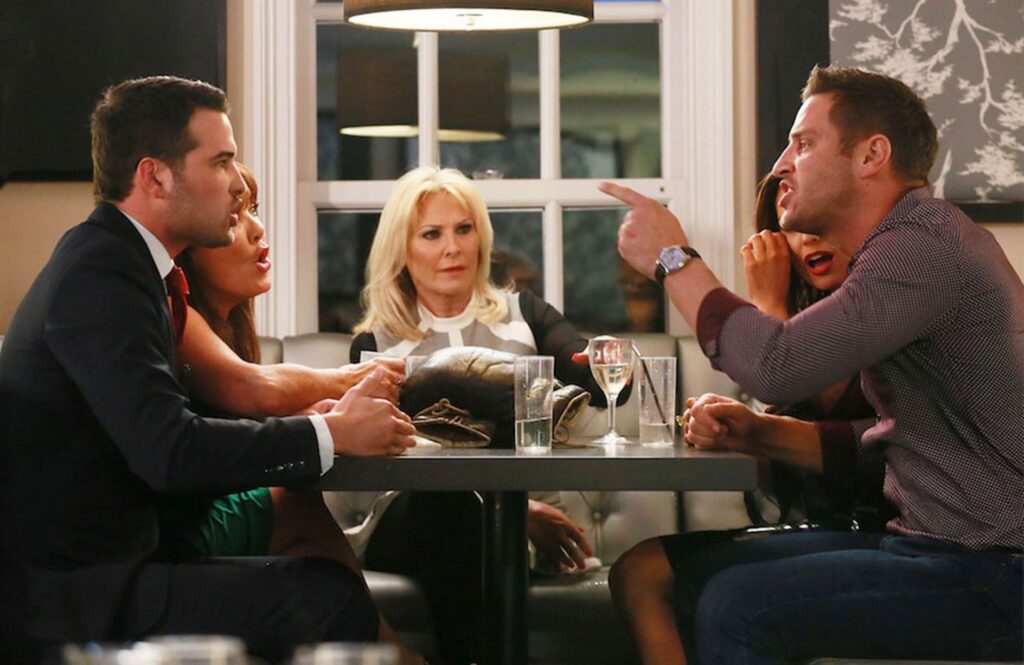Healthy Leadership, Spiritual Living
How to Stop Losing Friends Over Politics: Six things to do, starting now

“There is always the danger that those who think alike should gravitate together into ‘coteries’ where they will henceforth encounter opposition only in the emasculated form of rumor that the outsiders say thus and thus. The absent are easily refuted, complacent dogmatism thrives, and differences of opinion are embittered by group hostility. Each group hears not the best, but the worst, that the other groups can say.”
― C.S. Lewis
“Anyone familiar with party systems has seen the disgust one party member is apt to show toward another whom he may really know nothing about other than that he is one of ‘the enemies.’ He cannot afford to know much about the person, for then he risks finding some redeeming feature in his enemy, and this is unacceptable. Any redemption for the enemy is a failure for propaganda which seeks separation between individuals; communion is defeat.”
― Daniel Schwindt
These are difficult and divided times. It seems like everything is political, and our thoughts and actions about them are determined by which camp we’re in. Wearing masks is political. Getting vaccinated is political. Standing during the national anthem is political. Many actors and celebrities are political, losing roles because of their views. Many churches are political.
Being “political” is one thing. Having views about issues that matter is important. But we’re taking it further. We’re not just political, we’re partisan, which is different … and dangerous. When I say “partisan” I’m referring to the mindset described in the quotes by Lewis and Schwindt above. Partisan is when we over-identify with our group, to the extent that we get blind to its failures and inconsistencies, and demonize those in “the other group.” Being political is normal and healthy … being partisan is abnormal and dangerous.

I can’t tell you how many people I know who’ve lost friends — and been alienated from family members — over political differences. The most visible recent example of this is Republican congressman Adam Kinzinger getting a scathing letter from his family — calling him an “embarassment to us and to God,” and accusing him of joining “the devil’s army” — after breaking with fellow Republicans to vote for the impeachment of Donald Trump. I suspect Thanksgiving Dinner might be a little awkward at the Kinzinger household this year.
Being in a Church Where We Can Disagree … and Still be Friends
In the church where I pastor, we have Christians with very strong — and very divergent — political views. In other words, we vote differently … but we’re still friends. We are not perfect, but this is one of many things I appreciate and am proud of about Bethel Church. We can agree to disagree. We can take different sides on political issues, and yet stay united in our love and respect for one another, and our common commitment to faith and our mission in this community. I realize this is getting less common.
Generations ago, Abraham Lincoln clearly articulated the spiritual dilemma of fellow believers taking different sides on issues when he wrote about what he saw happening during the civil war. Writing about people in the North and the South, he said:
“Both read the same Bible, and pray to the same God and each invokes His aid against the other. … The prayers of both could not be answered; that of neither has been answered fully. The Almighty has His own purposes.”
“But,” you might ask, “doesn’t it compromise your convictions when you hang out with people on the other side?” Does being a Republican in a church where you worship and rub shoulders with Democrats — and where you don’t hear sermons that push Republican views — make you less committed as a Republican? Does being a Democrat in a church where you rub shoulders with Republicans — and where you don’t hear sermons that push Democrat views — make you less committed as a Democrat? Not at all. It doesn’t make you less of a Republican — or less of a Democrat — to be in a place where you’re not settled in your own party bubble. It makes you better. It makes you wiser.
In my experience, being in healthy and respectful social groups outside your bubble doesn’t make you LESS committed to your views. Usually it makes you more committed … just not as arrogant about it. It doesn’t make you “wishy washy” about your views. Instead it usually has the opposite effect — it helps you clarify your views. It makes you smarter.
Okay, but HOW do we do This?

Here are six things that will help you live in a politically divided context, and keep your sanity, and your friends:
1. Remember this is not new. There have always been great differences in peoples’ political views (I’m writing specifically about the US here, but this is probably valid in other countries as well). Historian friends of mine have argued that there have been times in our country when citizens were even more politically divided than we are right now (and not just during the civil war). Our differences just feel more cataclysmic and insurmountable today. And we all know why: something is different today. It’s not our differences, its because we’re in a new media landscape. What is new is the endless barrage of mainstream media, talk radio, and social media that fills our heads. This media landscape amplifies our differences and distorts our perceptions of “the other guys.”
2. Keep in mind that – politically, socially, and spiritually – we are much more alike than different. The problem is that most of what we are hearing (again from mainstream media, talk radio, and social media) are voices from the extremes. I don’t know what to do as a society to change this. In the battle for attention, the loudest and most extreme voices are always the ones that “cut through” and get heard. Attempts at censoring disinformation on social media are probably necessary … but fraught with problems. I don’t think the landscape around us is going to change — we have to change how we deal with it. We need to find ways to tune out the loud, radical voices from the far left and right.
“Some of [our current political] divide is a matter of perception. Most people are not on the extremes of any of these issues, but most of what we HEAR is from people who are on the extremes.”
-Tania Israel
3. Cultivate humility and a willingness to question your assumptions and beliefs. Here’s a radical thought: you might be wrong. We all live in our own information bubbles, whether we admit it or not. Two of the wisest people in history — Socrates in the West and Lao Tzu in the East — were both known for recognizing how limited their knowledge was, and their willingness question their own views, and discard them with new and better information.
This kind of thinking makes Christians nervous, because we keep reminding each other that “truth doesn’t change,” and “God doesn’t change.” True enough. But that’s not really the issue. The real problem here is that our understanding of the truth, and our perceptions about God are limited, and therefore subject to revision and growth. Keep in mind the words of the Apostle Paul, who challenged Christians (in several places in the New Testament) to stop being like children and grow up. Part of that growing up involves letting go of foolish and childish ideas and embracing different ones; realizing that in this life, our knowledge is limited.
When I was a child, I talked like a child, I thought like a child, I reasoned like a child. When I became a man, I put the ways of childhood behind me. For now we see only a reflection as in a mirror; then we shall see face to face. Now I know in part; then I shall know fully, even as I am fully known.
– I Corinthians 13:11-12
4. Stop assuming people on the “other side” are stupid, brainwashed, or evil. Of course it’s possible that they are. But probably not. It’s actually more likely that they have legitimate reasons for their views, and are aware of problems and inconsistencies with yours. Remember that “dehumanizing the other” is a primal urge, and it has deadly consequences. This urge to dehumanize the other tribe is what paves the way for violence, civil war, and atrocities within wars.
5. Stop interacting with people about politics on social media. If you have friends with whom you disagree, and find yourself rolling your eyes when you read their social media posts … stop reading their social media posts! Just keep scrolling. Instead, call them up, go out for coffee, and just hang out with them (probably without talking about politics … see below). As I’ve written before, social media is a terrible medium for debate about big topics. Trying to discuss controversial subjects that have emotional weight just doesn’t work online. It’s too easy to be flippant and snide. It’s too hard — often impossible — to get any sense of nuance in someone’s view, or convey your emotional tone.
Social media has been around in various forms for 30 years. If they haven’t figured out yet how to make it work for meaningful personal debate, they aren’t going to. Let’s just stop trying. We need to have those discussions in person.
6. Get out of the convincing business. I heard this phrase from John Asseraff earlier this year. He uses this as his mantra: “I’m not in the convincing business.” I have come to agree with this, and have adopted it as an approach to my own life. I encourage you to do the same. Keep in mind that I am a pastor, counselor, speaker, and coach. You might think that each of these roles would put me in the “convincing business” … but no.
I realized long ago that the more I try to push something on someone, the more they push back. When people feel that I’m arguing for or selling them on something, they resist. It’s a natural consequence of growing up in a world that is filled with marketing messages. The more someone tries to sell us on something, the more we resist it.
The best I can do — and the only thing I CAN do — is to convey the truth as I see it as honestly and clearly as I can. Then it’s on the other person to respond as they see fit. It’s not my job to convince, it’s my job to convey. Remember that in the spiritual realm, it’s not our job to convince people of their need for God — that’s the Spirit’s job (John 16:8).
And of course, this concept is manifestly true when it comes to something as divisive and hotly contested as political views. Think of the countless statements, claims, and arguments you encounter on any given week. Do any of them change your mind? I bet not. Did Uncle Bob’s tirade at Thanksgiving last year convince you about the mask wearing conspiracy? Did your friend Brittany’s Facebook post about micro-aggressions change your mind? What makes you think that your opinions are going to convince anybody? What makes you so sure your opinions are even valid?
Let me finish by recommending two phrases to keep in mind: one to tell yourself, and one to tell your friends:
Use this phrase with yourself whenever you need to:
“I’m not in the convincing business.”
Use this phrase with your friends whenever you need to:
